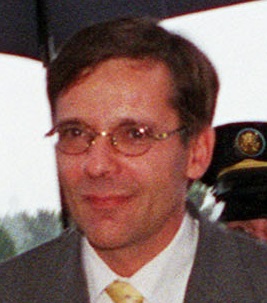Frank de Grave
( politician, banker) | ||||||||||||||||||||||||||||||
|---|---|---|---|---|---|---|---|---|---|---|---|---|---|---|---|---|---|---|---|---|---|---|---|---|---|---|---|---|---|---|
 | ||||||||||||||||||||||||||||||
| Born | 27 June 1955 | |||||||||||||||||||||||||||||
| Nationality | Dutch | |||||||||||||||||||||||||||||
| Alma mater | University of Groningen | |||||||||||||||||||||||||||||
Attended 1999 Bilderberg as Minister of Defence. Tried exposing a big Dutch bank to the De Nederlandsche Bank, was ignored initially.
| ||||||||||||||||||||||||||||||
Franciscus Hendrikus Gerardus (Frank) de Graveis a former Dutch politician. He attended the 1999 Bilderberg meeting as Minister of Defence
Education
De Grave studied Dutch law at the University of Groningen, majoring in state and administrative law and Public Finance. During his studies, De Grave became a board member of the law faculty/university council.
Career
De Grave was elected to the House of Representatives in the 1982 general election. In May 1990, De Grave was appointed as an Alderman in Amsterdam, he resigned from the House of Representatives the same day he was installed as installed as an Alderman, taking office on 8 May 1990. De Grave was acting Mayor of Amsterdam from 18 January 1994 until 1 June 1994. After the 1998 general election De Grave returned to the House of Representatives.
In 1998 De Grave was appointed Minister of Defence. The Netherlands participated in the 1999 NATO attack on Yugoslavia.[1]
One of the most noticable things Frank De Grave had to do was the decision-making around the purchase of the F-35 from Lockheed Martin. At the fall of the Cabinet on 16 April 2002, just a month before the election, the final decision on this had not yet been made.
The cabinet resigned on 16 April 2002 following the conclusions of the NIOD report into the Dutch role around Srebrenica during the Bosnian War.
After the 2002 general election, De Grave again returned to the House of Representatives, but was not giving a cabinet post. In March 2004, De Grave was nominated as chairman of the board of directors of the Council for Healthcare Supervision of the Ministry of Health, Welfare and Sport, he resigned from the House of Representatives the same day he was installed as chairman, taking office on 1 April 2004. In January 2006 the Council for Healthcare Supervision was renamed as the Healthcare Authority with De Grave continuing as chairman of the board of directors, sitting from 1 January 2006 until 31 December 2008.
DSB Bank
In March 2009 De Grave joined DSB Bank. After only two months, in May 2009, De Grave left DSB. According to the press release of DSB, there was an insufficient match in the personal relations between De Grave and the board of DSB. De Grave was not allowed to say anything from the DSB about his departure. Shortly after De Grave's departure, DSB came into dispute for providing excessive loans. In May 2009, De Grave had a conversation with the bank supervisor DNB (the central bank). It seemed that De Grave had wanted to denounce abuses about the DSB; however, De central bank did not address DSB. DSB was eventually fined by the Netherlands Authority for the Financial Markets.[2]
Event Participated in
| Event | Start | End | Location(s) | Description |
|---|---|---|---|---|
| Bilderberg/1999 | 3 June 1999 | 6 June 1999 | Portugal Sintra | The 47th Bilderberg, 111 participants |